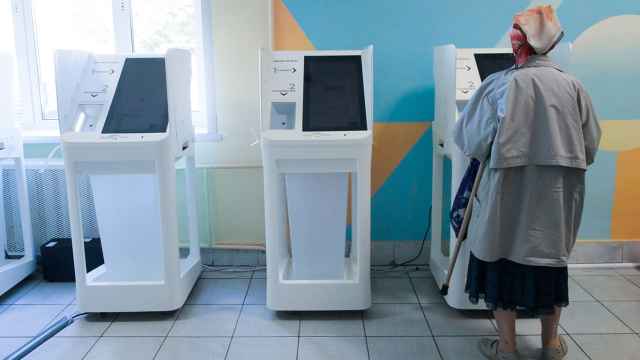
Five years ago, then-President Dmitry Medvedev met with leading representatives of Russia's online media community — digital entrepreneurs, executives, scholars, authors and some opposition-minded bloggers. The gathering took place in a refurbished Moscow City Youth Library, and it had the look and style of a U.S. town hall meeting.
Back then, exactly one year before President Vladimir Putin's return to Kremlin, the reality of Russian media seemed so different. The participants addressed matters of the future, they spoke about innovation and openness, competitiveness and globalization. Of course, they talked about the problems: about free speech, media development and excessive state participation. But the assumption was that government was open for discussion. After all, Medvedev had promised an innovation economy.
Today, however, Russian media has been transformed from head to toe. Over five difficult years, state doctors have taken a scalpel to any "organs" non-compliant to the new rules — like RIA Novosti in December 2013. They applied "legal chemotherapy" to the rest, literally expelling foreign capital from media business. Aesculapian authorities practiced laparoscopic manipulations to remove undesirable journalists and editors from news outlets. And under a "genetic" treatment, the principles of editorial independence and freedom of expression were replaced by values of censorship, loyalty, manipulative propaganda and agenda-setting.
Roughly half of the participants of the famous Medvedev meeting in May 2011 are now either expelled from mass media, or live under scrutiny and legal persecution. Svetlana Mironyuk works for a bank, Anton Nossik had been charged for supposed "extremism" in a blog post, while the Russian startup leaders are now mostly based in California's Silicon Valley.
An even bigger change occurred outside the media business. Over those five years, the Kremlin learned a trick or two about its public. It now understood that propaganda works only when you have reframed and primed your audience. Academics have yet to study the mass social manipulation that took place between 2012 and 2016. But we can say with some certainly that Russia has witnessed a shift from relatively pluralistic and open media to a new form altogether. Today Russian media channels a "besieged fortress" mind-set, and represents a jingoistic and socially conservative tribe that negates any kind of "foreign values." The demand for neutral journalism has all but disappeared.
This transformation could not have happened without pressure from above. But it has also taken on an energy of its own. In order to "satisfy" the demand for a conservative mind-set, major Russian news outlets have became even more nationalistic, anti-Western and conservative than required.
There are few truly independent media companies operating in Russia today, and even fewer influential ones. Within dependent — controlled by state or its oligarch-agents — newspapers and television stations, laparoscopic exercises continue. This is the case with RBC (RosBusinessConsulting), arguably Russia's most thorough and independent news organization, but ultimately dependent on the wider business interests of its billionaire owner, Mikhail Prokhorov. Whatever the reasons that have been given regarding the departure of editor-in-chief Yelizaveta Osetinskaya, it is safe to assume the Kremlin pushed Prokhorov to appoint a less combative editor to head the publication.
Putin's five-year plan to conquer the media and free speech is celebrating an undoubted success across all traditional, broadcast and digital media. The commercial press, whether pro-government, oppositional or neutral, has been forced to adopt his agenda. It is an agenda that considers Russia to be more important then Russians, the state to be superior to citizens and power to be better then freedom.
You may pray for it or you may condemn it. But you can't avoid it. As journalist, author or editor in Russia you act under the scenario of Putin's playbook, leading down a road of no return, right up to the media cemetery.
Yet, with all such apocalyptic pictures in mind, there is a professional resurgence in some distinct areas — like the Latvia-based Meduza news website, the advocacy-based Takie Dela and Mediazona, and the education-based Arzamas.Academy, Open Lectures and Open University. Those startups feature innovative ideas, advanced journalism and creative use of content — and employ the creme de la creme of modern Russian journalists.
Smaller and less ambitious in scale then earlier democratic media, these experiments, in fact, secure the future of socially responsible communication in Russian society.
When society will ask for it again, however, is another question.
Vasily Gatov is a media researcher, analyst, media investment expert and board member of WAN-IFRA.
A Message from The Moscow Times:
Dear readers,
We are facing unprecedented challenges. Russia's Prosecutor General's Office has designated The Moscow Times as an "undesirable" organization, criminalizing our work and putting our staff at risk of prosecution. This follows our earlier unjust labeling as a "foreign agent."
These actions are direct attempts to silence independent journalism in Russia. The authorities claim our work "discredits the decisions of the Russian leadership." We see things differently: we strive to provide accurate, unbiased reporting on Russia.
We, the journalists of The Moscow Times, refuse to be silenced. But to continue our work, we need your help.
Your support, no matter how small, makes a world of difference. If you can, please support us monthly starting from just $2. It's quick to set up, and every contribution makes a significant impact.
By supporting The Moscow Times, you're defending open, independent journalism in the face of repression. Thank you for standing with us.
Remind me later.







